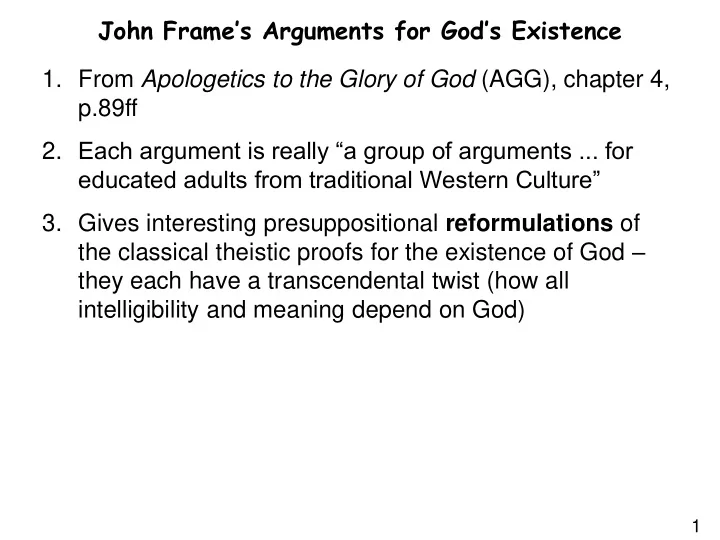

John Frame’s Arguments for God’s Existence 1. From Apologetics to the Glory of God (AGG), chapter 4, p.89ff 2. Each argument is really “a group of arguments ... for educated adults from traditional Western Culture” 3. Gives interesting presuppositional reformulations of the classical theistic proofs for the existence of God – they each have a transcendental twist (how all intelligibility and meaning depend on God) 1
Frame’s Moral Argument for God’s Existence ( AGG 93-99) AGREED MORAL VALUES e.g. robbery & murder wrong - objective truths – obligations (deny these, deny objective rationality) SOURCE OF ABSOLUTE MORAL AUTHORITY? IMPERSONAL CHANCE PERSONAL RELATIONSHIPS e. g. obligations to parents ABSOLUTES NEED But how does this create right & wrongs; obligations & loyalties? ABSOLUTE PERSON Schaeffer alternatives: & no THE BIBLICAL TRIUNE GOD basis to • Tyranny – Communism Implies fight evil Moral Justice etc • Anarchy - Looting Absolute Eternal aseity • Democracy - Hitler CHOICE Chaos God No rational basis for thinking & acting Objective rationality & morality 2
Summary of Frame’s Moral Argument (AGG 93 -99) What is the ground of moral values? Morals (agreed values) source: impersonal chance OR absolute person chaos OR biblical triune God 3
Frame’s Moral Argument - Simplified AGREED MORAL VALUES e.g. robbery & abuse wrong SOURCE OF ABSOLUTE MORAL AUTHORITY? IMPERSONAL GOOD RULER, PERSONAL CHANCE & LOVING TRUINE GOD No basis for morals and no Have basis for morals basis to fight against evil 4
Showing their rock is not like our rock (Dt 32v31) UNBELIEVER BELIEVER Pr 26v4,5 Sand of Rock of 2 fold presuppositional world’s God our strategy wisdom Saviour show REFORMULATED MORAL ARGUMENT – example of above SOURCE or GROUND OF ABSOLUTE MORAL AUTHORITY? IMPERSONAL CHANCE ABSOLUTE PERSON THE TRUINE BIBLICAL GOD No rational basis for morals Objective rationality & morality 5
Frame’s Epistemological (Rationality) Argument (AGG 102 -4) SOURCE OF RATIONALITY e.g. making sense of the world, using logic RATIONALITY INCLUDES OBLIGATIONS/MORALS e.g. If I confess that “all men are mortal” and that “Socrates is a man,” what is that requires me to confess that “Socrates is mortal” ? ABSOLUTE PERSON IMPERSONAL CHANCE THE BIBLICAL TRIUNE GOD e.g. evolution But how do we get rationality Moral Argument from non-rationality? above 6
Summary of Frame’s Epistemological (Rationality) Argument (AGG 102-4) What is the ground of human rationality? Rationality (R) including R’s obligations/morals (M): chance OR biblical triune God, as the basis for R & M 7
Summary of Frame’s Teleological (Purpose) Argument (AGG 105-9) What is the ground of human recognizing purpose and design? Recognize design (e.g. DNA, eye) and evil BASED ON having rationality and morals => Moral Argument above 8
Summary of Frame’s Cosmological (Cause) Argument (AGG 109-14) What is the ground of reasoning about cause? Cause gives a reason why things happen BASED ON Commitment to reason => Moral Argument above i.e. God is the author of reason, & causes rest ultimately in God OR left with irrationality and self-defeating search for causes 9
Frame’s own summaries of his traditional arguments for God’s existence with a transcendental twist s Moral Argument: All meaning and reasoning presupposes moral principles. But moral principles in turn presuppose God as absolute personality . AGG 93-102. Epistemological Argument: Shows that human reasoning is futile without moral standards, and that those standards in turn presuppose God. See moral argument. AGG 102-104. Teleological Argument: One cannot even speak of “purpose” or “design” apart from moral values (see moral argument ), which in turn presuppose God. AGG 105-109. Cosmological Argument: If we try to discuss “cause” without God, our reasoning degenerates into rationalism and/or irrationalism . AGG 109-114. From the Glossary, Apologetics (3) in Speaking the Truth in Love: The Theology of John Frame, 1017 – 18 10
Summary of Frame’s Ontological (Being) Argument (AGG 114-8 and Christian Apologetics RTS Course p.40-3) Anselm’s formulation , 1078 AD (from Miller, Believing in God: Readings on Faith and Reason p.24ff): 1. God is that, than which nothing greater can be conceived. 2. To exist is greater than to exist in the understanding only. 3. Therefore, God exists – “ this being you are, O Lord, our God.” Problems : • Will Premise 1 be acceptable to unbeliever? • In Premise 1: What does “God” and “nothing greater” mean? • Jumps from what God is like in the mind, to he exists in reality Actually Anselm is praying to the God whom he “believes & loves” Reformulation as a Christian presuppositional argument: 1. An appeal to one’s “presupposition,” concept of perfection. 2. For Christians: the God of Scripture, our concept of perfection, must exist; OR, all evaluations and assertions are meaningless. 11
Recommend
More recommend